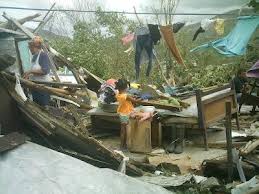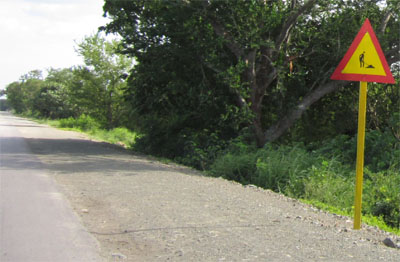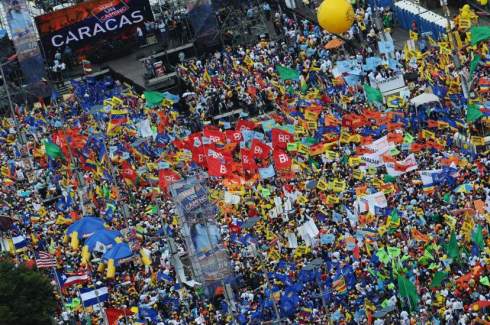You are currently browsing the monthly archive for October 2012.
 Sandy’s passing across the eastern provinces and the catastrophic consequences have left me with the following questions:
Sandy’s passing across the eastern provinces and the catastrophic consequences have left me with the following questions:
Why must all solidarity by necessity pass through government channels?
Why don’t the Committees for the Defense of the Revolution (CDRs) ask their members to bring support to the offices of each Zone?
Why doesn’t the Federation of Cuban Woman (FMC) ask the women affiliated with it to bring something to the organization’s Blocks?
Why don’t the Pioneer organizations invite the children to donate some school uniforms?
Why doesn’t the Association of the Combatants of the Revolution ask its members to offer to help the victims?
Are they waiting to receive orders from higher authorities or will their own hearts dictate their supportive conduct?
29 October 2012
 Although the fever to comment on the new travel and immigration legislation has already passed, I don’t want to let it pass me by. To those who ask me in circumstances where there’s little time to respond, I tell them the following:
Although the fever to comment on the new travel and immigration legislation has already passed, I don’t want to let it pass me by. To those who ask me in circumstances where there’s little time to respond, I tell them the following:
The Cuban government has eliminated the humiliating Permission to Leave and established in its place the Permission to Possess a Passport, which is somehow worse because it denies the citizen the right to possess identification before the rest of the world.
If we have a little more time, then I say that I would have wished the first article of the new law would say more or less the following:
All Cuban citizens, by the mere fact of having been born in this archipelago, have the right to possess a passport and, once granted a visa by another country, to leave Cuba with it for as long as he deems appropriate and to return, as many times as his resources allow. This right can only be violated by court judgement, where the citizen has all procedural guarantees of defense and appeal.
The absence of the word “right” is the most important omission in the new law.
22 October 2012
Tomorrow, October 16, will mark 59 years since Fidel Castro was tried for Cause Number 37 related to the assault on the Moncada Barracks in Santiago de Cuba. Some of his biographers say that at the trial he delivered his plea of self-defense known as “History Will Absolve Me,” others say that what he said was much shorter and less substantive and that it was later, in the serenity of the fecund prison that he wrote what his memory dictated. In the backyard of my house in Camaguey there should still be a copy of that first edition in a glass jar that my father — for fear of a search — buried in a site we could never find.
In that text, where his political platform is foreshadowed, we can appreciate the thought of a man of the center-left who mentions the theme of exploitation of the workers but does not announce the dictatorship of the proletariat, who denounces the excesses of the United Fruit Company but does not condemn imperialism by its name. Already in the decade of the ‘60s, conforming to the triumphalist spirit of the official media, the fulfillment of the Moncada program was proclaimed. Those days the author of the submission confessed that he was already, at the time, a Marxist-Leninist.
We were far from imagining that that anti-tyrannical young man would get his hands on, for a half century, absolute power over the fates of Cubans. No one should be judged twice for the same act, neither by the courts nor by history. On that occasion Fidel Castro was sentenced to 15 years in prison, of which he only served less than 20 months, because the bloody and ruthless dictatorship of Fulgencio Batista, hearing the popular outcry, decreed an amnesty for political prisoners. It was an amnesty, not parole.
The history subsequently written not only absolved but congratulated the authors of the assault. I am speaking of the history books that my son studies in school and all the history books that have been allowed to be published in Cuba. With regards to what happened (let the reader choose the facts) no court had ever ruled.
Tomorrow will be another day.
15 October 2012
We’re already used to perceiving the interrogation tactic of “good cop, bad cop,” so it’s only natural that those of us who are usually on the other side of the questioning think of duplicating the method.
On October 4 at around 5:30 in the afternoon an impressive police operation stopped us at the entrance to the city of Bayamo to prevent us from attending the trial of Angel Carromero. Yoani Sanchez, Agustin Lopez and I had crossed the 500 miles that separated us from Havana in a Moskovich make car. We suspected they wouldn’t let us enter the courtroom, but we didn’t think we merited the deployment of forces with which they intercepted us.
Yoani and Agustin have already told their stories. Yoani chose to clam up like an oyster, neither responding to questions nor taking food or water. She was the bad prisoner, impenetrable. I chose instead to respond, to drink fluids and, although I wasn’t on a hunger strike, I refused food (white rice and a chicken leg) simply because I had no appetite.
An investigating officer who introduced himself as Captain Céspedes (What a coincidence, a Céspedes in Bayamo!) let me know that I was under investigation for the presumed crime of “defamation of the heroes and martyrs of the Revolution,” which I later learned is really called “Defamation of institutions and organizations and of heroes and martyrs,” as defined in Article 204 of the Penal code.
I will not relate here all the dialog verbatim, just my impressions. The most notable was that, according to what my interrogator hinted at, his opinions about us were not based on information provided as evidence, nor on the reports of experts, but by what he had learned through “enemy propaganda” that had been divulged in the official Cuban media. Full of good faith as I am, I suppose that this officer, a serious, respectful and meticulous man, could not reveal the real results of the investigations because if he had we could not have been processed.
Another interesting detail is that when I was explaining the reason for our presence in Bayamo I told the investigator that the newspaper Granma (which never lies?) had published that the trial would be oral and public, so we had the right as citizens to attend. Cespedes responded that this did not include counterrevolutionaries. I couldn’t resist the temptation and argued that when Cuban decriminalizes political dissent it would not be possible to stop a citizen from attending a trial previously announced as oral and public.
With the firmness that is used to state one’s deepest convictions, my interlocutor warned me as follows: “We will never permit the counterrevolution to do what it wants.” In my role as the good prisoner I clarified that luckily it would not be them who would be governing the country and that the day this decision happened he would have to obey the order, as befits a soldier.
Then he let me sleep on a single bed with a foam mattress in a room with air conditioning and at noon on the 5th we returned to the capital in a minibus that traveled escorted by police cars sounding their sirens from Bayamo all the way to Guanabacoa.
Arriving in front of the building where we live, Yoani, the bad prisoner, shot out like greased lightning and went up the elevator. Once in the lobby, after returning to me my confiscated belonging, I said goodbye to the other officer who came to the front of the caravan. “I’m sorry I cannot thank you,” I said, “we would have preferred to return another way and you have hindered us.”
The Moskovich made another journey, but that is related by Dekaisone.
8 October 2012
A neighbor who is always joking asked me yesterday, “Do you know what the polls say about who’s going to win the elections in Cuba?” Obviously it was impossible for me to respond.
As much as Venezuelans fear their country is looking like Cuba so in the end we ourselves must imitate Venezuela. What we have come to!
1 October 2012



